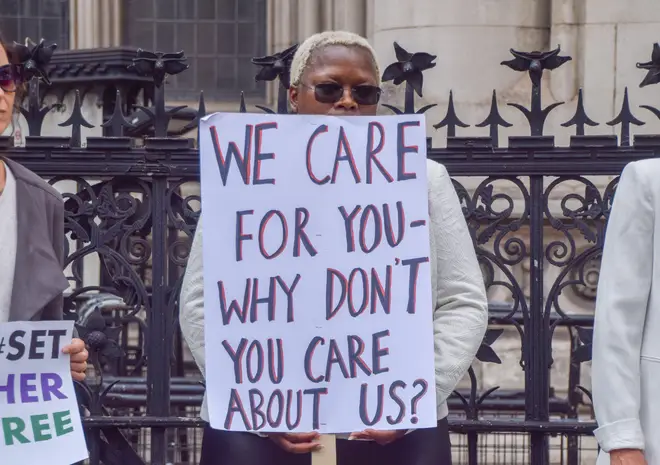
Vanessa Feltz 3pm - 6pm
27 July 2022, 12:55

Scottish and Welsh ministers have made a joint call for the UK government to protect migrant women from male violence in a move which again sees two devolved governments work together to attempt a change of policy in Whitehall.
The move came after the Home Office announced partial ratification of the Istanbul Convention, a landmark European treaty on protecting women from violence, which the UK first signed up to a decade ago but has only just partially enacted.
The convention obliges signatories to take steps to tackle violence against women and girls, but Article 59, which protects migrant women, has not been included by the UK Government.
Now Scotland's equalities minister Christina McKelvie and Welsh social justice minister Jane Hutt have written a joint letter to the UK's safeguarding minister, Amanda Solloway, urging her to "do the right thing by migrant women" by ratifying Article 59.
Speaking to LBC, Christine McKelvie said: “It's good to see the Convention has finally been partially ratified but there doesn't seem to be a lot of reasoning behind creating an exemption, allowing them to carve out an opt out basically for migrant women.
“That runs counter to our Equally Safe programme in Scotland and our stated aim that all women should have the same protection irrespective of what their status is. I've got no idea why the UK Government wants to carve that out.”
In a letter to the UK’s safeguarding minister Amanda Solloway, the ministers write: "A key element of the Istanbul Convention is the obligation it places on states to implement its provisions without discrimination on any grounds and we urge you to take this obligation seriously."
The ministers also questioned the need to keep Article 59 under review while awaiting the results and evaluation of the Support for Migrant Victims (SMV) scheme.
They said: "As the pilot is testing the question of how, not whether, migrant victims and survivors are supported, we are not clear why this would lead you to submit a reservation to Article 59.
"The pilot would appear to be more about operational practice which, while clearly important, does appear secondary to the principle behind Article 59. It is on these grounds that we ask you to withdraw the exemption immediately."
McKelvie said the impact of the exemption also ensured that migrant women who are victims of violence and have no recourse to public funds can’t access traditional support services.
“These are the women who are probably most vulnerable,” she said. “So they should have that support. It feels like that point is about how right wing can you actually be? Let's carve out exemptions that mean if you're a migrant woman and you're a victim of domestic violence, then sorry we can't help you.
“That's just not acceptable at all. I don't understand the reason for it. And I just think again, as part of that hostile environment and that right wing ideology, you know that people coming from other places shouldn't get the same support as anybody else but I believe they should - and these women are already here in the UK.”
A Home Office spokesperson said ratifying the Convention had sent “a strong message that the government is committed to tackling violence against women and girls.
"Anyone who has suffered domestic abuse must be treated as a victim first and foremost, regardless of immigration status, and we will carefully consider the findings of the Support for Migrant Victims Scheme pilot.
"This does not affect a migrant victim's ability to get support and regularise their stay here, and we are providing these victims of domestic abuse with an additional £1.4m in funding for 2022-23."
McKelvie added: “Maybe with a change of government with a new prime minister who comes with a different set of values and ideals, hopefully that change can be delivered, but it's pretty marked that both I in Scotland and the minister in Wales, Jane Hutt, are both singing from the same page here, because we both of us believe in the exact same approach and we're just baffled as to why the UK Government has taken the position it has with some very, very vulnerable people.”
Previously the Scottish and Welsh governments have taken joint stances on immigration, the economy and the Human Rights Act.